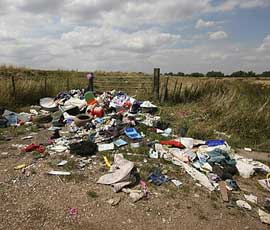DEFRA to crack down on fly-tipping

More people are being prosecuted for fly-tipping as incidences of the illegal activity are falling, figures show.
However, the government says it must do more to tackle the illegal dumping of waste.
DEFRA secretary Caroline Spelman said “Fly-tipping figures are down and prosecutions are up, but the menace of fly-tippers still cost taxpayers more than £40 million every year.
“That’s why we’re cracking down by giving enforcement authorities stronger powers to seize suspected fly-tippers’ vehicles, and working with the courts to make sure the punishment fits the crime.”
Dumping rubbish along highway verges and other public places was irresponsible, damaged the environment and spoiled everyone’s enjoyment of the countryside, she added.
The latest government figures on fly-tipping show that local authorities carried out around 568,000 enforcement actions in 2010-11 to prevent, detect or enforce against fly-tipping – a 5.8% increase over 537,000 in 2009-10.
This included 2,400 prosecutions against suspected waste offenders, of which 96% resulted in convictions. Other actions included 276,000 investigations, 139,000 warning letters and 1,800 formal cautions.
Local authorities spent around £20.6m on enforcement action against fly-tipping in 2010-11 – an increase of around 5.8% on the previous year (£19.1m.
However, local authorities in England reported nearly 820,000 incidents of fly-tipping in 2010-11 – a decrease of 13.5% compared with last year.
Of the fly-tips dealt with by local authorities, 63% involved household waste; 60% fell into the “small van” or “car boot load or less” size categories and 44% occurred on highways.
The estimated cost of clearance by local authorities in 2010-11 was £41.3 million, a reduction of £4.5 million (9.8%) compared to 2009-10.
The Government announced in the Waste Review that it would be introducing stronger powers for local authorities and the Environment Agency to seize vehicles suspected of involvement in fly-tipping and considering the deterrent effects of the current levels of fines.
“We are also working with private landowners on the particular problems associated with fly-tipping on their land,” said Mrs Spelman.
Join our conversation about rural cirme on our forum
